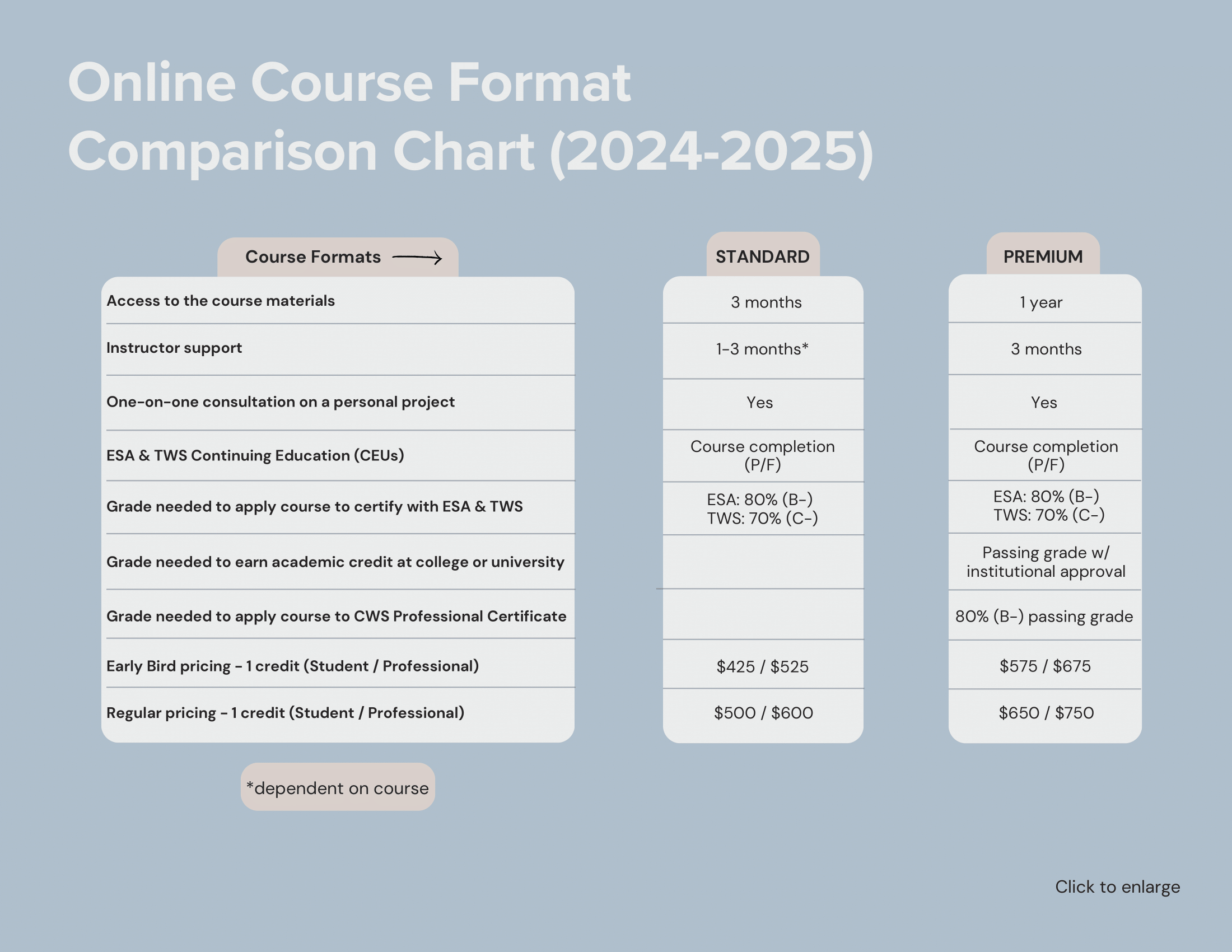Plant Identification for Wildlife Biologists
-
Plants structure ecosystems and provide habitat and food for wildlife. As such, identifying and classifying plants are essential skills for wildlife biologists but are often underemphasized in wildlife curriculums or overlooked altogether. This course gives students a foundation in the practical skills needed to identify and classify plants in their location of interest (e.g., study area, forest, park, management unit). Students will learn how to define characteristics of plants, classify plants into major plant groups and common plant families, and use technical keys to identify plant species from their local areas. By the end, students will produce a digital plant collection for their location of interest. Credit from successful completion of this course can be used to earn professional certifications (e.g., The Wildlife Society’s Certified Wildlife Biologist®), and if taken for academic credit, can meet the minimum educational requirements for federal and state wildlife biology jobs that require formal education in botany and the related plant sciences.
-
Spring: May 27 - July 20, 2025 (with course access through August 17)
(Early bird* ends April 27)
*Early bird saves $75
-
None
-
TOPICS:
Major plant groups, from mosses to flowering plants
Structure and terminology of flowers, leaves, and stems
Identifying trees and shrubs
Identifying herbaceous plants
LEARNING OUTCOMES:
After taking this course, students will be able to:
Collect, press, and photograph particular parts of a plant to help plant identification
Use plant keys to systematically identify plant specimens
Organize specimens in a digital plant collection for your study area
COURSE OPTIONS & INFORMATION (Review chart above, then click below)
-
FORMAT:
3 months of access to course materials as you work at your own pace
Get instructor support via email, discussion threads, group meetings, and one-on-one appointments
After working through the course materials, set up an optional meeting with the instructor to discuss your own personal project from work or school
CONTINUING EDUCATION:
16 CEUs with The Wildlife Society
4 CEUs in Category I(a): Scientific Education and Training with the Ecological Society of America
Go to our Continuing Education Page for more details
CERTIFICATIONS:
Earn 1 credit toward certification as an Associate/Certified Wildlife Biologist® with The Wildlife Society
Earn 1 credit toward certification as an Ecologist (at any level) with Ecological Society of America
-
FORMAT:
12 months of access to course materials as you work at your own pace
Get instructor support for the 3-month term via email, discussion threads, group meetings, and one-on-one appointments
CONTINUING EDUCATION:
16 CEUs with The Wildlife Society
4 CEUs in Category I(a): Scientific Education and Training with the Ecological Society of America
CERTIFICATIONS:
Earn 1 credit toward certification as an Associate/Certified Wildlife Biologist® with The Wildlife Society
Earn 1 credit toward certification as an Ecologist (at any level) with Ecological Society of America
ACADEMIC CREDIT:
Go to our Academic Credit Page for details
Earn an additional 1-2 academic credits with an Applied Project
PRIMARY INSTRUCTOR
“As someone who has primarily worked with animals, I found it really valuable to learn foundational systematics and biology of a broad range of plant groups. The course had a simple yet effective structure of lectures, short quizzes, and hands-on exercises that encouraged me to go out into the field. The instructor was very responsive with her feedback, and it was useful to be able to see posts from other students as well. I now have a much stronger interest in plants and plant ecology, and I look forward to learning more!’
Max Falkenberg
Conservation Educator, Wildlife Conservation Society Bronx Zoo
SCHOLARSHIPS
Full scholarships are available to participants from countries designated as “lower income” and “lower middle income” in the World Bank List of Economies. Please see our CWS World Scholars Program page for details.
CANCELLATION POLICY
Cancellations 30 days or more before the start date are not subject to cancellation fees. Cancellations <30 days before the start date are subject to a 50% cancellation fee. No refunds once the course begins.





